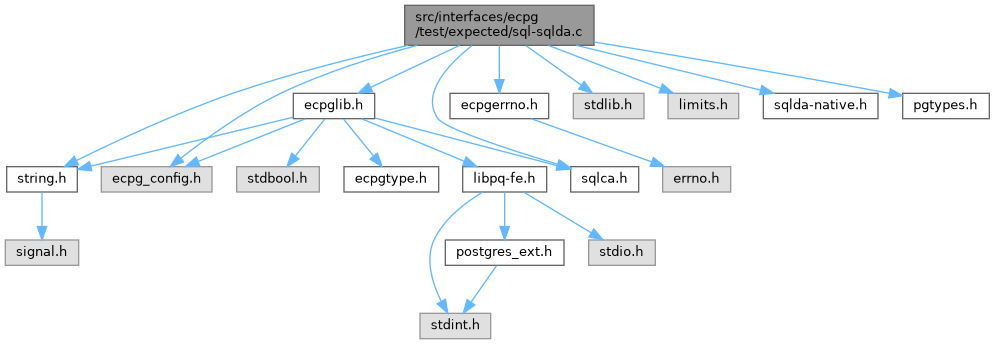#include <ecpglib.h>#include <ecpgerrno.h>#include <sqlca.h>#include <stdlib.h>#include <string.h>#include <limits.h>#include "ecpg_config.h"#include "sqlda-native.h"#include <pgtypes.h>
Go to the source code of this file.
Data Structures | |
| struct | numeric |
| struct | decimal |
Macros | |
| #define | ECPGdebug(X, Y) ECPGdebug((X)+100,(Y)) |
| #define | ECPG_SQLDA_H |
| #define | PGTYPES_NUMERIC |
| #define | NUMERIC_POS 0x0000 |
| #define | NUMERIC_NEG 0x4000 |
| #define | NUMERIC_NAN 0xC000 |
| #define | NUMERIC_NULL 0xF000 |
| #define | NUMERIC_MAX_PRECISION 1000 |
| #define | NUMERIC_MAX_DISPLAY_SCALE NUMERIC_MAX_PRECISION |
| #define | NUMERIC_MIN_DISPLAY_SCALE 0 |
| #define | NUMERIC_MIN_SIG_DIGITS 16 |
| #define | DECSIZE 30 |
Typedefs | |
| typedef struct sqlvar_struct | sqlvar_t |
| typedef struct sqlda_struct | sqlda_t |
| typedef unsigned char | NumericDigit |
Variables | |
| sqlda_t * | inp_sqlda |
| sqlda_t * | outp_sqlda |
| sqlda_t * | outp_sqlda1 |
Macro Definition Documentation
◆ DECSIZE
| #define DECSIZE 30 |
Definition at line 64 of file sql-sqlda.c.
◆ ECPG_SQLDA_H
| #define ECPG_SQLDA_H |
Definition at line 28 of file sql-sqlda.c.
◆ ECPGdebug
◆ NUMERIC_MAX_DISPLAY_SCALE
| #define NUMERIC_MAX_DISPLAY_SCALE NUMERIC_MAX_PRECISION |
Definition at line 60 of file sql-sqlda.c.
◆ NUMERIC_MAX_PRECISION
| #define NUMERIC_MAX_PRECISION 1000 |
Definition at line 59 of file sql-sqlda.c.
◆ NUMERIC_MIN_DISPLAY_SCALE
| #define NUMERIC_MIN_DISPLAY_SCALE 0 |
Definition at line 61 of file sql-sqlda.c.
◆ NUMERIC_MIN_SIG_DIGITS
| #define NUMERIC_MIN_SIG_DIGITS 16 |
Definition at line 62 of file sql-sqlda.c.
◆ NUMERIC_NAN
| #define NUMERIC_NAN 0xC000 |
Definition at line 57 of file sql-sqlda.c.
◆ NUMERIC_NEG
| #define NUMERIC_NEG 0x4000 |
Definition at line 56 of file sql-sqlda.c.
◆ NUMERIC_NULL
| #define NUMERIC_NULL 0xF000 |
Definition at line 58 of file sql-sqlda.c.
◆ NUMERIC_POS
| #define NUMERIC_POS 0x0000 |
Definition at line 55 of file sql-sqlda.c.
◆ PGTYPES_NUMERIC
| #define PGTYPES_NUMERIC |
Definition at line 51 of file sql-sqlda.c.
Typedef Documentation
◆ NumericDigit
Definition at line 66 of file sql-sqlda.c.
◆ sqlda_t
| typedef struct sqlda_struct sqlda_t |
Definition at line 40 of file sql-sqlda.c.
◆ sqlvar_t
| typedef struct sqlvar_struct sqlvar_t |
Definition at line 39 of file sql-sqlda.c.
Function Documentation
◆ dump_sqlda()
Definition at line 131 of file sql-sqlda.c.
References ECPGt_char, ECPGt_double, ECPGt_int, ECPGt_long, ECPGt_long_long, ECPGt_numeric, fb(), i, PGTYPESchar_free(), PGTYPESnumeric_to_asc(), printf, and val.
Referenced by main().
◆ main()
Definition at line 178 of file sql-sqlda.c.
References sqlda_struct::desc_next, dump_sqlda(), ECPG_NOT_FOUND, ECPGconnect(), ECPGdeallocate(), ECPGdebug, ECPGdisconnect(), ECPGdo(), ECPGprepare(), ECPGprepared_statement(), ECPGst_execute, ECPGst_normal, ECPGt_char_variable, ECPGt_EOIT, ECPGt_EORT, ECPGt_int, ECPGt_NO_INDICATOR, ECPGt_sqlda, ECPGtrans(), fb(), free, inp_sqlda, malloc, outp_sqlda, outp_sqlda1, printf, sqlca, sqlvar_struct::sqldata, sqlda_struct::sqln, sqlvar_struct::sqltype, and sqlda_struct::sqlvar.
◆ PGTYPESdecimal_free()
◆ PGTYPESdecimal_new()
◆ PGTYPESnumeric_add()
Definition at line 637 of file numeric.c.
◆ PGTYPESnumeric_cmp()
Definition at line 1281 of file numeric.c.
◆ PGTYPESnumeric_copy()
Definition at line 1388 of file numeric.c.
Referenced by numericvar_to_double(), PGTYPESnumeric_from_double(), and PGTYPESnumeric_to_asc().
◆ PGTYPESnumeric_div()
Definition at line 1053 of file numeric.c.
◆ PGTYPESnumeric_free()
Definition at line 385 of file numeric.c.
Referenced by numericvar_to_double(), PGTYPESnumeric_from_asc(), PGTYPESnumeric_from_double(), and PGTYPESnumeric_to_asc().
◆ PGTYPESnumeric_from_asc()
Definition at line 321 of file numeric.c.
Referenced by PGTYPESnumeric_from_double().
◆ PGTYPESnumeric_from_decimal()
◆ PGTYPESnumeric_from_double()
Definition at line 1411 of file numeric.c.
◆ PGTYPESnumeric_from_int()
Definition at line 1309 of file numeric.c.
◆ PGTYPESnumeric_from_long()
Definition at line 1318 of file numeric.c.
Referenced by PGTYPESnumeric_from_int().
◆ PGTYPESnumeric_mul()
Definition at line 896 of file numeric.c.
◆ PGTYPESnumeric_new()
Definition at line 42 of file numeric.c.
Referenced by numericvar_to_double(), and PGTYPESnumeric_to_asc().
◆ PGTYPESnumeric_sub()
Definition at line 765 of file numeric.c.
◆ PGTYPESnumeric_to_asc()
Definition at line 343 of file numeric.c.
Referenced by dump_sqlda(), and PGTYPESnumeric_to_long().
◆ PGTYPESnumeric_to_decimal()
◆ PGTYPESnumeric_to_double()
Definition at line 1483 of file numeric.c.
◆ PGTYPESnumeric_to_int()
◆ PGTYPESnumeric_to_long()
Definition at line 1518 of file numeric.c.
Referenced by PGTYPESnumeric_to_int().
Variable Documentation
◆ inp_sqlda
| sqlda_t* inp_sqlda |
Definition at line 128 of file sql-sqlda.c.
Referenced by main().
◆ outp_sqlda
| sqlda_t * outp_sqlda |
Definition at line 128 of file sql-sqlda.c.
Referenced by main().
◆ outp_sqlda1
| sqlda_t * outp_sqlda1 |
Definition at line 128 of file sql-sqlda.c.
Referenced by main().